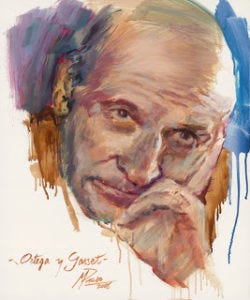Ortega y Gasset and the Wisdom of Editors

Jose Ortega y Gasset, 2008, Manuel Pardo
Or the wisdom of one editor, in particular. I’ve a special fondness for Adam Garfinkle, editor of The American Interest. I read his work devotedly long before I began writing for his magazine, and always sensed in his writing not only an old-fashioned, well-trained intellect, but a sensibility in his prose that reminded me a bit of Montaigne, or as Hoffer said of Montaigne, “He was writing about me. He knew my innermost thoughts.” I felt this especially when reading his War, water, and negotiation in the Middle East: the case of the Palestine-Syria border, 1916-1923.So, just before the first round of the French election, Adam was valiantly occupied in turning my raving and unprintable thoughts about the Turkish referendum into an article he could publish in a family newspaper. During our editorial back-and-forth, we exchanged a few tangential e-mails about the question on everyone’s minds these days: Why is the world going to hell in a handcart? Now, I don’t usually expect anyone to offer me a serious answer to that question; so I was surprised I got one. He kindly gave me permission to reproduce it. To put it context, I sent him an email lamenting that the world was going to hell in a handcart. The upcoming French election was Exhibit A:
[T]here’s at least a 50 percent chance that at least one total lunatic will make it through the first round, and a non-zero chance that both could make it, in which case France is doomed. I don’t at all like this wild irrationality that’s coursing through the veins of the Western body politic. It just can’t end well, even if France squeaks through this time. And I just don’t know what it’s really about, do you?
I didn’t expect a real answer, so I was surprised to receive one:
As to what is really going on, in France and elsewhere Western, well, in something I wrote not too long ago I quoted Ortega y Gasset from 1930, and I wish people would pay more attention to exactly what the man said, really ponder what he said. I (cleverly) referred to this as the “revolt of the asses” in contemporary terms:
The Fascist and Syndicalist species were characterized by the first appearance of a type of man who did not care to give reasons or even to be right, but who was simply resolved to impose his opinions. That was the novelty: the right not to be right, not to be reasonable: “the reason of unreason.”
As to the source of it, I can cite three interwoven elements: the Heideggerian-inspired or inflected fatigue with reason; the lapsed attention spans that render deep reading, and hence thinking, increasingly rare; and the falling away of the moral discipline of the Abrahamic moral code. As to the last one, all I can say if whosoever does not like the jealous God must prepare to contend with the crowd that preceded him, for no vacuum is possible here. It’ll be Lord of the Flies, all day every day.
All this is what I was trying to get at back in the summer with my essays on the nadir of modernity. Ah, but you will say: Look, if the problem really goes that deep, then there’s not much we can do about it. And that would, I think, be correct.
Anyway, what is happened now in France is indeed scary. A fascist, a lunatic communist, and a kept child … none of whom has any chance of connecting usefully to a parliament elected by party. Quel dommage, eh?
Indeed.
Think you can explain the situation better than he did in that sentence about the three interwoven elements? I sure can’t. Give it a try, though, if you’re up for the challenge.




